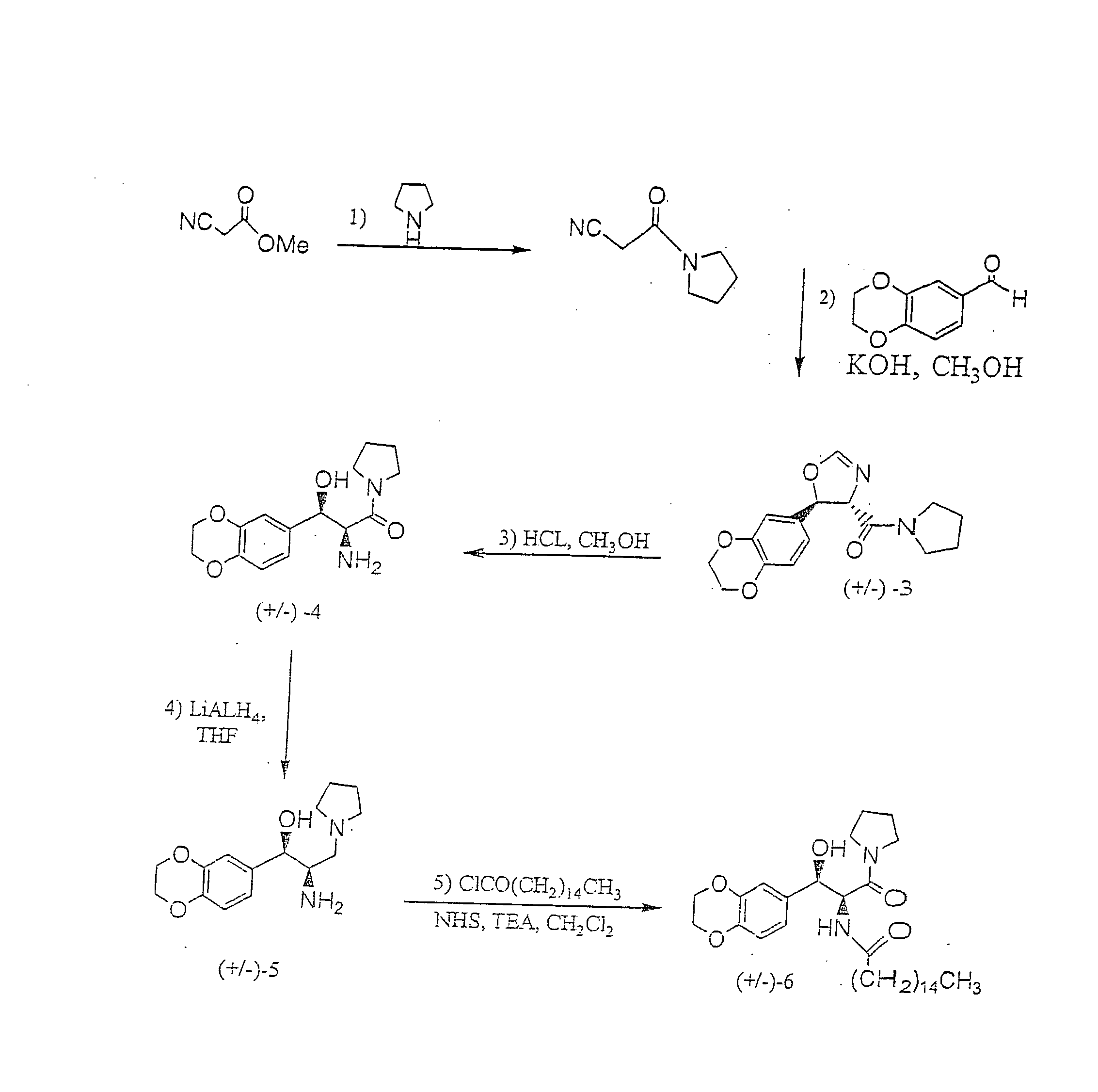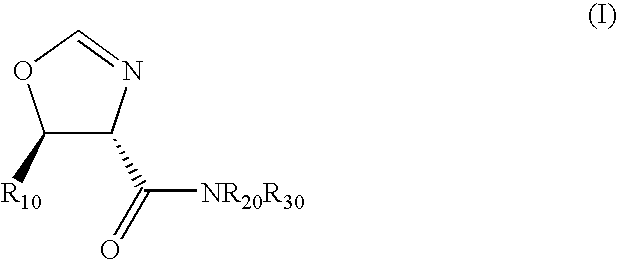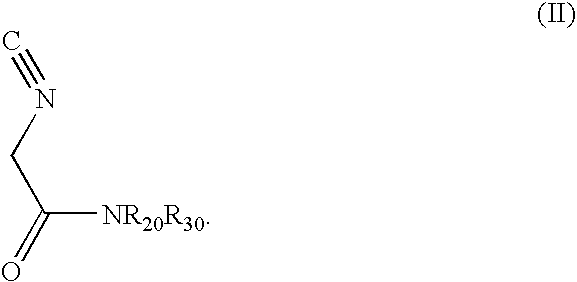Diastereoselective synthesis of UDP-glucose: N-acylsphingosine glucosyltransferase inhibitors
a technology of nacylsphingosine and glucosyltransferase, which is applied in the field of diastereoselective synthesis of udp-glucose, can solve the problems that chromatography is generally poorly suited for large-scale preparations and the known methods of preparing ceramide-like compounds are poorly suited for industrial production and other problems, to achieve the effect of high diastereoselectivity and efficient production
- Summary
- Abstract
- Description
- Claims
- Application Information
AI Technical Summary
Benefits of technology
Problems solved by technology
Method used
Image
Examples
example 1
1-(Isocyano-Acetyl)-Pyrrolidine
To a stirred and cooled (0° C.) methyl isocyanoacetate (technical grade, 95%; 5.00 g, 47.8 mmol) was slowly added pyrrolidine (6.5 ml, 78 mmol). The mixture was stirred overnight with continued cooling and then concentrated. The resulting oil was repeatedly coevaporated from methylene chloride / hexane to remove residual pyrrolidine. Crude product, which was used in the next step without further purification, was thus afforded as 6.35 g (96%) of dark brown oil: 1H NMR (CDCl3) δ 4.24 (s, 2H), 3.53 (t, J=6.8, 2H), 3.41 (t, J=6.8, 2H), 2.02 (quintet, J=6.8, 2H), 1.90 (quintet, J=6.8, 2H) ppm.
example 2
(±)-Trans-[5-(2,3-Dihydro-Benzo[1,4]Dioxin-6-yl)-4,5-Dihydro-Oxazol-4-yl]-Pyrrolidin-1-yl-Methanone
To a stirred and cooled (0° C.) solution of potassium hydroxide (2.70 g, 48.1 mmol) in methanol (30 ml) was added a mixture of 1,4-benzodioxan-6-carboxaldehyde (8.20 g, 50.0 mmol) and the product from Example 1 (6.30 g, 45.6 mmol). The solution was stirred overnight with continued cooling and then concentrated. The residue was partitioned between ethyl acetate and water. The organic layer was combined with additional ethyl acetate extracts, washed with aqueous sodium chloride and dried (magnesium sulfate). Concentration afforded crude product as a golden, glassy solid. Flash chromatography over silica (ethyl acetate) yielded 9.40 g (68%) of product as a colorless glassy solid. 1H NMR (CDCl3) δ 6.99 (s, 1H), 6.90-6.78 (m, 3H), 6.00 (d, J=7.3, 1H), 4.58, (d, J=7.3, 1H), 4.26 (s, 4H), 3.95-3.87 (m, 1H), 3.55-3.41 (m, 3H), 2.04-1.80 (m, 4H) ppm.
example 3
(±)-Threo-2-Amino-3-(2,3-Dihydro-Benzo[1,4]Dioxin-6-yl)-3-Hydroxy-1-Pyrrolidin-1-yl-Propan-1-One Hydrochloride
To a solution of the product from Example 2 (3.94 g, 13.0 mmol) in methanol was added hydrochloric acid (2.2 ml). After heating (50° C.) the mixture for 3 hours, more hydrochloric acid (1.0 ml) was added and heating was continued for an additional 45 minutes. The reaction was then concentrated and the resulting yellow oil was coevaporated twice with ethyl acetate before solidifying. Trituration (ethyl acetate) and vacuum oven drying afforded 3.78 g (88%) of product as a bright yellow solid. 1H NMR (CD3OD) δ 6.90-6.82 (m, 3H), 4.73 (d, J =9.2, 1H), 4.23 (s, 4H), 4.04 (d, J=9.2, 1H), 3.42-3.18 (m, 3H), 2.35-2.24 (m, 1H), 1.83-1.67 (m, 2H), 1.67-1.43 (m, 2H) ppm.
PUM
| Property | Measurement | Unit |
|---|---|---|
| Enantiomer | aaaaa | aaaaa |
Abstract
Description
Claims
Application Information
 Login to View More
Login to View More - R&D
- Intellectual Property
- Life Sciences
- Materials
- Tech Scout
- Unparalleled Data Quality
- Higher Quality Content
- 60% Fewer Hallucinations
Browse by: Latest US Patents, China's latest patents, Technical Efficacy Thesaurus, Application Domain, Technology Topic, Popular Technical Reports.
© 2025 PatSnap. All rights reserved.Legal|Privacy policy|Modern Slavery Act Transparency Statement|Sitemap|About US| Contact US: help@patsnap.com



